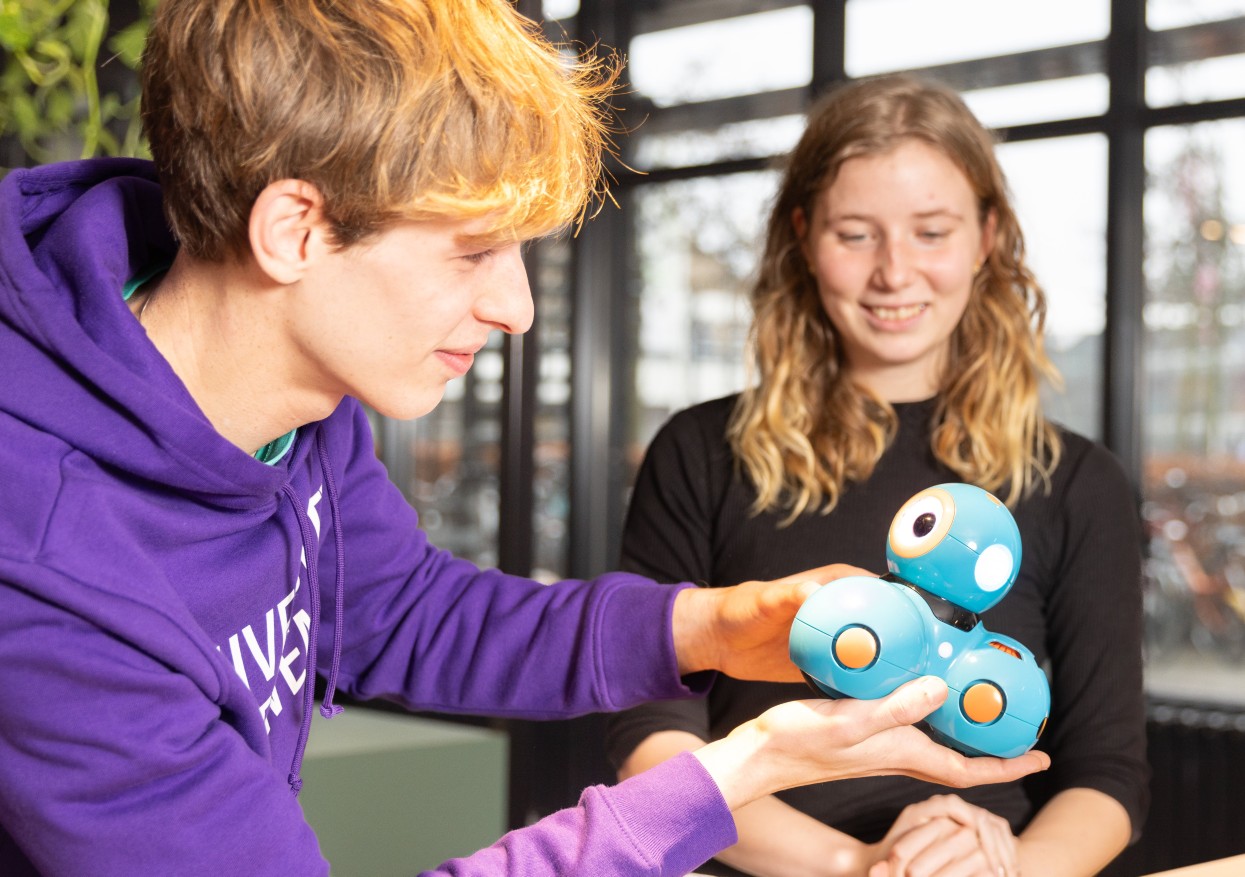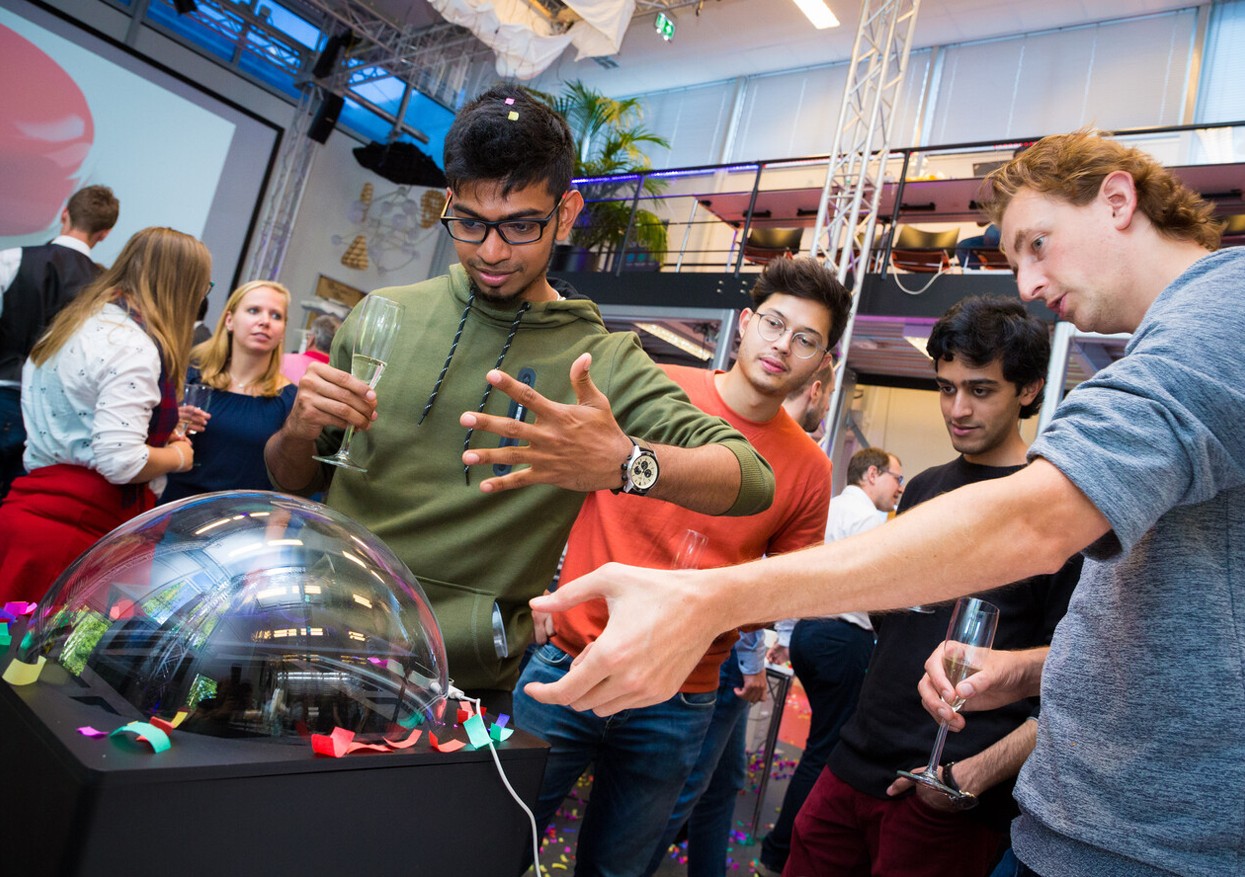
Master of Science
Interaction Technology
Introduction Master Interaction Technology
Delve into the field of human-computer interaction and design and develop interactive technologies that are meaningful to people and society.
Human-computer interaction
In today’s 21st century, modern technology is integrated into our daily lives more than ever before. But none of the advanced technologies we use today would have been successful if humans failed to interact with them. Human-computer interaction is one of the most important considerations in any kind of technological development. So how can you include the user in those developments? For example, what does it take to design a robot that can recognise and respond to human emotions? Or a technology that enables mediated social touch between loved ones? If you are interested in the field of human-machine interaction and you want to design and develop interactive technologies that are meaningful to people and society, the Master’s in Interaction Technology is right for you.
FOCUS
In this two-year, English-taught Master’s, you will study as well as shape the interaction between people and (IT-based) technologies. From ideation to prototyping to evaluation; you will learn to design intelligent, interactive and socially aware systems that are aligned with end-user needs and can enhance user experience. To do so, you will gain knowledge within fields such as computer science, human-machine interaction, Artificial Intelligence, and/or electrical engineering, and complement this with an in-depth understanding of human behaviour and user contexts.
Career Perspectives
With the rise of new technologies, devices, and forms of connectivity, we see more and more intelligent, interactive systems, capable of supporting and extending human activities. With such smart innovations rapidly unfolding, there’s a growing demand for experts in the field of interaction technology, who can truly embody the view of the user. You can look forward to great career opportunities after graduation!
Your future career
In today’s highly competitive (digital) markets, successful design in terms of human-computer interaction is one of the most important prerequisites; it can be the difference between success and failure. Many organisations are looking for graduates with your expertise, from leading tech and software development companies to digital agencies to many other organisations in different sectors, for example in the medtech (medical technology) or edtech (educational technology) industry. Alternatively, you can expand your specialist expertise by pursuing a PhD or EngD programme as facilitated by UT's Twente Graduate School (TGS).
Where do graduates work?
Wherever your interests lie, this Master's prepares you for a broad range of positions in a wide range of companies. Possible positions are:
- Software developer
- UX designer / consultant
- Front-end developer
- Project manager
- Multimedia designer
Many graduates of this Master’s currently work within the ICT sector, focusing on user experience, whereas others went on to work as a researcher within a research institute. UT alumni with a Master’s degree in Interaction Technology found exciting jobs in various organisations. For example:
- Front-end Developer at Nedap Healthcare
- Scientist Innovator at TNO Research
- Design Technologist & UX Prototyper at Miele
You might also launch your own start-up, like some of our former students did! Whichever career path you choose, your expertise in key fields of engineering and technology as well as human behaviour and interactions between people and technology is welcomed in a wide variety of organisations and sectors.

Master's structure How to compose your master's?
You have a great deal of freedom in putting together your own Master’s and aligning it with your interests and ambitions. With a broad selection of courses to choose from within domains of technology, social sciences, design, research, entrepreneurship and more, you can develop your own unique profile!
You will collect 120 EC within two years. You have a great deal of freedom in composing your own curriculum. Together with the programme mentor, you will discuss how to compose a set of courses meeting your specific interests, while also complying with the coherence of the programme as a whole.
Six pillars
You will build your curriculum around six pillars. Within each pillar, there’s a large variety of courses you can choose from, to help you gain knowledge and skills across the full breadth of the field of nteraction technology.
The six pillars include Technology, Understanding Humans & Context, Research, Storytelling, Design, and Impact, Innovation & Entrepreneurship. Additionally, there is an elective space of 25EC allowing you to either choose more courses, do an internship or take some courses at a university abroad.
You will end your Master’s in Interaction Technology by writing your master’s thesis (30 EC). You can conduct your final project within the industry, perform research at the UT or complete your thesis abroad. The course Research Topics (10 EC) serves as a preparation for your thesis.
Content of this Master's
Learn to recognise and act upon human challenges and opportunities by creating and evaluating meaningful, intelligent, interactive systems.
This Master’s combines research, design, and entrepreneurship, enabling you to design and develop new interactive technologies and systems that are meaningful to people and society. In that sense, you will ask yourself: how can technology support or enrich people’s lives? And how does technology best suit their wishes and needs? You will work on impactful solutions for relevant, real-life challenges. For example, how can speech technology assist people who cannot speak? Or what does it take for people to trust and accept a care robot?
On the technology side, you can take in-depth courses in computer science, artificial intelligence and/or electrical engineering. On the human side, you will learn to analyse human behaviour and user contexts but also develop your entrepreneurial, design and storytelling skills to ensure the best possible connection between your technological solution and the people or organisations you are developing it for. In the end, it’s about understanding and conveying the value of a technology or any other interactive system in today’s society.
What will you learn?
After completing the Master's in Interaction Technology, you:
- have knowledge of methodologies for user-oriented design, including the drafting of user requirements and user studies
- are able to think out of the box and find innovative solutions for real-life, societal problems
- will have thorough knowledge and understanding of intelligent interaction employing techniques taken from AI in a multidisciplinary approach.
Examples of courses you follow during this Master's:
- In the course Brain Computer Interfacing, you will learn to explain and apply methods for analysing and classifying brain waves, using EEG technology.
- The course Social Robot Design will teach you to use methods from the world of interaction design (UcD, UxD, Co-design) and apply them in the specific context of Social Robot Design.
- How can an application recognise and generate affective/social behaviour? The course Affective Computing provides an overview of several research areas such as emotion theory, data collection and annotation, vocal and facial expression analysis, machine learning and social signal processing, and affect generation.
double degree in human computer interaction and design
If you are interested in the field of human-computer interaction, combined with innovation and entrepreneurship, you can also opt for the double degree programme in Human Computer Interaction and Design (HCID) of the EIT Digital Master School. This international Master's entails two years and allows you to study one year – either the first or the second – at the University of Twente and one year abroad at one of the following partner universities in Helsinki, Stockholm, Madrid, Milan, or Trento.
Interaction Technology Experience
"When I graduated from Creative Technology, I didn't know exactly what I wanted to do. I ended up doing an internship at a company that makes VR applications for the construction industry. During this internship, I discovered once again how much I enjoyed working on the interaction design of digital products. That is when I decided to enrol in the Master's in Interaction Technology."
If you ask me, the interaction between humans and computers is increasing nowadays, but our understanding of it is decreasing. Nowadays, almost everyone has a smartphone, all office jobs require a computer and VR and AR are increasingly used in the entertainment industry and for training (e.g. surgeons practicing a difficult operation). Good interaction design is necessary to ensure that these products are a real addition to our lives and make our lives easier, more efficient and, above all, more fun. For example, during my thesis, I actually studied how the specific technology virtual reality can be used to meet a societal need.
CONFRONTING FEARS WITH VR
With functional near-infrared spectroscopy (fNIRS), I measured the brain activity of people while they were standing in virtual reality on a tall building. With various machine learning algorithms, we studied to what extent we can detect and predict fear responses. This technology can eventually be applied in a real therapy setting, for example to expose people to their fears in a safe and controlled way. It was amazing to be able to combine my knowledge of virtual reality, brain-computer interfaces and machine learning, all of which I studied during my master's, in just one project.
A COMPUTER-CONTROLLED LIFE?
Interactive systems are (simply put) systems where there is an interaction between man and computer, often to achieve a certain goal. But it can also be intended for entertainment. For example, the self-service checkout in the supermarket, your phone, the ATM or the infotainment system of a car. For some people technology plays a bigger role in their lives than they realise. As a matter of fact, we might have even become very dependent on technology.
I think that I-Tech can do a lot in terms of designing the best possible human-computer interaction, also for future technologies and systems. That is literally what you learn in this Master’s. Nevertheless, I also think that we must make people aware of how dependent they are on technology and to what extent certain systems are safe or not. Instead of just focusing on the 'seamless integration' of technology in everyday life. As far as I am concerned, we should also make our users aware of the ethical aspects of certain technologies.
A GOOD BASIS FOR FUTURE JOBS
When I was looking for a job after my graduation, I noticed that there is a lot of interest in people who can look at things from different perspectives. We live in a world where technology is becoming more important. However, it is also important to ensure that we continue to deal with this technology and understand how these changes impact our lives. Their added value, but also possible threats. I also noticed that companies are extremely interested in my broad orientation and hands-on experience in certain areas. In my opinion, most important when landing a new job is showing that you mastered many different techniques and that you can learn others quickly. The Master’s in Interaction Technology definitely provided me a good basis for future jobs!”

Need and nice-to-know Student information
There are a couple of things you should know before you apply for the Master in Interaction Technology. In addition, you will find some nice-to-know information about this Master's.
Need more challenge?
As a student at the University of Twente, you have many opportunities to expand your knowledge outside of your own Master’s as well. Are you up for a challenge? Gain additional meaningful and multidisciplinary skills and knowledge to be able to respond to societal challenges and questions even more effectively. Complementing your Master’s with an additional programme might be the perfect way to do so.
get support 24/7 during your application
Do you have questions about your transfer options, deadlines, starting dates or costs, to name just a fewtopics? Collecting all relevant information to apply for a study can be daunting. Even though everything can be found on our websites, the amount of information you need to read can seem overwhelming. This is where chatbot Sam comes in! Together with this handy and fast conversation method, you can browse through all the information you need to apply. Start up a chat!
YOU CAN START YOUR (PRE-)MASTER'S IN SEPTEMBER OR FEBRUARY.
apply now!
Have you decided that you want to study the Master's in Interaction Technology at the University of Twente? Find out if you are admissible and apply via our website.
ADMISSION REQUIREMENTS
Applicants for the Master’s in Interaction Technology should have a Bachelor’s degree Computer Science, Cognitive Science, Electrical Engineering, or an equivalent qualification. Next to this, we require knowledge of the following topics: Linear Algebra, Statistics & Probability, Calculus, Experience with either Artificial Intelligence or Human Computer Interaction. Find out if you are admissible using our transfer tool.
Additional requirements
International students: English-language test results.
- Academic IELTS, overall band score of at least 6.5;
- TOEFL, internet-based (TOEFL-iBT) of at least 90;
- Cambridge CAE-C (CPE).
For the minimum CPGA of your country, please visit our master’s website.
DO THE ONLINE ELIGIBILITY CHECK
Find out if you are admissible to this Master's within five minutes with our eligibility check! This e-check is created for upcoming master's students with an international bachelor's degree to verify that they meet the specific admission requirements for this Master's. For students with an international degree, it is mandatory to complete the e-check. Start the check, it takes about five minutes to complete it.
DUTCH UNIVERSITY OF APPLIED SCIENCES
Depending on your previous education and your grades, you may need to complete a pre-master’s first. Directly related to Interaction Technology are: Computer Science, Artificial Intelligence, Media Technology, Creative Technology, Design or an equivalent qualification. The starting date of the pre-master’s is in September and February. After finishing your pre-master’s successfully, you can directly enter the Master’s. It is also possible to complete the pre-master’s as a minor during your Bachelor’s degree. Minor students can enter the Master’s in February or September after finishing the pre-master’s.
For more specific admission requirements, please visit our website.
Why choose to study at UT?
As a UT student, you will learn how to use innovative technologies to influence today's societal challenges meaningfully. You will benefit from excellent, highly personalised education and research in fields ranging from social sciences and engineering to natural sciences and life sciences. You will learn to work with experts from other disciplines and cultures. In doing so, you will develop in-depth professional knowledge and intensive personal growth.
Your study location is our campus: a dynamic community for young people to work, live and socialise. It's a breeding ground for brilliant ideas, where you follow academic education and apply your new skills in the various state-of-the-art labs. This is also where you meet up with friends, play sports or visit the theatre. You can even go for groceries or catch up in the bar. And downtown Enschede is just a 10-minute bike ride away!

